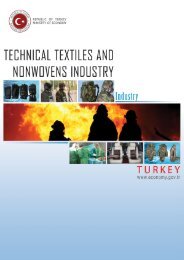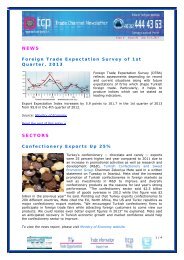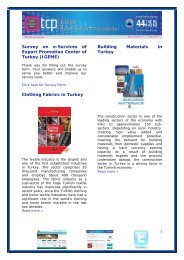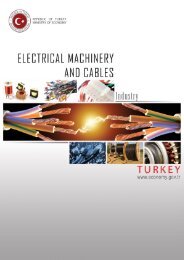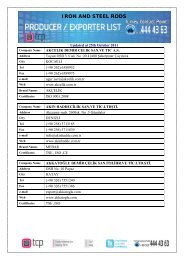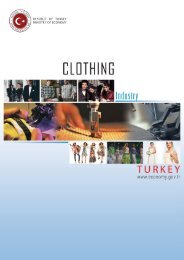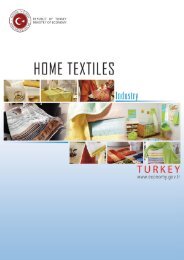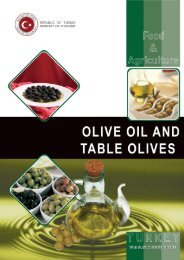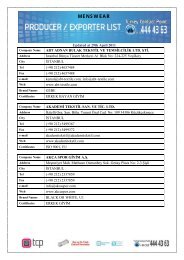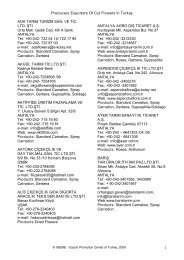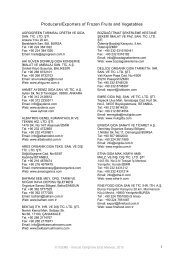chemical industry in turkey - Turkey Contact Point
chemical industry in turkey - Turkey Contact Point
chemical industry in turkey - Turkey Contact Point
You also want an ePaper? Increase the reach of your titles
YUMPU automatically turns print PDFs into web optimized ePapers that Google loves.
© Republic of <strong>Turkey</strong> – M<strong>in</strong>istry of Economy, 2014 0
CHEMICAL INDUSTRY IN TURKEY<br />
Chemicals are <strong>in</strong>dispensable to modern life and the development of the <strong>chemical</strong> <strong><strong>in</strong>dustry</strong><br />
has helped to elevate the standard of liv<strong>in</strong>g, an <strong>in</strong>dicator of the level of <strong>in</strong>dustrialization <strong>in</strong> a<br />
country. Chemical <strong><strong>in</strong>dustry</strong> products contribute significantly to growth <strong>in</strong> other <strong>in</strong>dustrial<br />
sectors.<br />
At the beg<strong>in</strong>n<strong>in</strong>g of the 20th century there were a few <strong>chemical</strong> establishments,<br />
manufactur<strong>in</strong>g soap, liquorice extract, valonia extract, etc, with<strong>in</strong> the boundaries of the<br />
Ottoman Empire. After the establishment of the Republic of <strong>Turkey</strong> till the 1950s, these<br />
<strong>chemical</strong> works passed through a process of corporation and production began <strong>in</strong> some<br />
fields such as explosives, medic<strong>in</strong>e, agricultural <strong>chemical</strong>s, detergents, pr<strong>in</strong>t<strong>in</strong>g <strong>in</strong>k and<br />
textile dyes and <strong>in</strong>volved the f<strong>in</strong>al stages only. It was only after the 1950s, especially<br />
dur<strong>in</strong>g the planned economy period, that the development of the <strong>chemical</strong> <strong><strong>in</strong>dustry</strong> <strong>in</strong><br />
<strong>Turkey</strong> accelerated. Between 1960 and 1980 economic policies were based on import<br />
substitution and public sector <strong>in</strong>vestments were directed to petro<strong>chemical</strong>s, fertilizers and<br />
basic organic and <strong>in</strong>organic <strong>chemical</strong>s, the fields which required high <strong>in</strong>vestment, with low<br />
profitability whereas private sector and foreign <strong>in</strong>vestments were directed to<br />
pharmaceuticals, synthetic yarns, soaps and detergents.<br />
In 1980 <strong>Turkey</strong> started to follow a new export-oriented economic policy. As a result of<br />
these successful policies, production and exports of the manufactur<strong>in</strong>g sector boomed.<br />
The <strong>chemical</strong> <strong><strong>in</strong>dustry</strong>, likewise, benefited from the new economic policy and showed an<br />
impressive <strong>in</strong>crease both <strong>in</strong> production and exports.<br />
Today, the Turkish <strong>chemical</strong> <strong><strong>in</strong>dustry</strong> with its modern technology and diversified products<br />
is the key component of the <strong><strong>in</strong>dustry</strong> and <strong>in</strong>tegrated <strong>in</strong>to supply cha<strong>in</strong> of national <strong>in</strong>dustries,<br />
especially, textiles and automotive sectors.<br />
PRODUCTION<br />
<strong>Turkey</strong> has been manufactur<strong>in</strong>g <strong>chemical</strong>s for very long time, be<strong>in</strong>g a producer of many<br />
basic and <strong>in</strong>termediate <strong>chemical</strong>s and petro<strong>chemical</strong>s. Turkish <strong>chemical</strong> production<br />
<strong>in</strong>cludes petro<strong>chemical</strong>s, <strong>in</strong>organic and organic <strong>chemical</strong>s, fertilizers, pa<strong>in</strong>ts,<br />
pharmaceuticals, soaps and detergents, synthetic fibers, essential oils, cosmetics and<br />
personal care products. The majority of <strong>chemical</strong>s production is done by the private sector.<br />
In <strong>chemical</strong> <strong><strong>in</strong>dustry</strong>, 30 % of the production has been directly used by the consumers<br />
whereas 70 % of production has been benefited <strong>in</strong> other sectors as <strong>in</strong>termediate goods<br />
and raw materials. Turkish Chemical <strong><strong>in</strong>dustry</strong> has been seen as a sector dependent on<br />
imports as regards to raw materials and technology. However, <strong>Turkey</strong> is among one of the<br />
lead<strong>in</strong>g countries <strong>in</strong> the world that has boron, chrome, soda ash and trona reserves.<br />
The <strong>chemical</strong> <strong><strong>in</strong>dustry</strong>, together with the sub-<strong>in</strong>dustries such as plastics and rubber,<br />
employs nearly 200.000 people and has about 6,2 thousand companies manufactur<strong>in</strong>g<br />
various <strong>chemical</strong>s. Very small percentages of the exist<strong>in</strong>g companies have more than 150<br />
employees. Most of the companies <strong>in</strong> the <strong>chemical</strong> <strong><strong>in</strong>dustry</strong>, especially private sector<br />
companies, are located <strong>in</strong> Istanbul, Izmir, Kocaeli, Sakarya, Adana, Gaziantep and<br />
Ankara.<br />
© Republic of <strong>Turkey</strong> – M<strong>in</strong>istry of Economy, 2014 1
Turkish <strong>chemical</strong> <strong><strong>in</strong>dustry</strong> has developed significantly <strong>in</strong> terms of quality, productivity and<br />
protection of the environment, and is <strong>in</strong> the process of adopt<strong>in</strong>g the EU’s Technical<br />
Standards. In addition, the responsible care, the <strong>chemical</strong> <strong><strong>in</strong>dustry</strong>’s trademarked noncompulsory<br />
<strong>in</strong>itiative on environmental, health and safety issues, has been successfully<br />
implemented s<strong>in</strong>ce 1992.<br />
Turkish petro<strong>chemical</strong> <strong><strong>in</strong>dustry</strong> has shown considerable growth s<strong>in</strong>ce 1970. As an<br />
upstream producer, TÜPRAŞ (Turkish Petroleum Ref<strong>in</strong>eries Corporation) operates as the<br />
only <strong>in</strong>tegrated Ref<strong>in</strong>ery <strong>in</strong> <strong>Turkey</strong> with its 4 ref<strong>in</strong>eries <strong>in</strong> Izmit, Izmir, Kırıkkale and Batman.<br />
On the other hand, as a downstream producer, the unique company <strong>in</strong> the Turkish<br />
petro<strong>chemical</strong> <strong><strong>in</strong>dustry</strong> is PETKİM Petrokimya Hold<strong>in</strong>g A.Ş. which is the only <strong>in</strong>tegrated<br />
petro<strong>chemical</strong> complex <strong>in</strong> <strong>Turkey</strong> that operates <strong>in</strong> Petkim-Aliağa complex <strong>in</strong> İzmir. In<br />
PETKİM’s Aliağa complex, a wide range of petro<strong>chemical</strong>s, all common plastics (HDPE,<br />
LDPE, PS, PVC, and PP), aromatics, ethylene glycol, phtallic anhydride, terephthalic acid,<br />
carbon black, synthetic rubber, acrylonitryl and caustic soda are produced. The total<br />
production of these petro<strong>chemical</strong>s meets about 30 % of domestic demand.<br />
S<strong>in</strong>ce the textile sector is a well-developed sector <strong>in</strong> <strong>Turkey</strong>, polymer production related to<br />
textiles and the production of textile <strong>chemical</strong>s have also developed simultaneously. Large<br />
plants for the production of polyamide, polyester and acrylic fibers have been built and<br />
production has been directed to both the foreign markets as well as the domestic market.<br />
Almost all synthetic fibers are produced by the private sector and synthetic fiber production<br />
is around 850 000 tons/year.<br />
The fertilizer <strong><strong>in</strong>dustry</strong> is one of the key <strong>in</strong>dustries for <strong>Turkey</strong>, which has vast agricultural<br />
potential. The first <strong>in</strong>dependent fertilizer plant commenced production <strong>in</strong> 1954 and heavy<br />
fertilizer <strong>in</strong>vestments were realized between the years 1960-1970.<br />
Pharmaceuticals, soap and detergents, soda, chromium <strong>chemical</strong>s, boron <strong>chemical</strong>s,<br />
pa<strong>in</strong>ts, sodium sulphate, fatty acids and rose oil are the other ma<strong>in</strong> areas of production of<br />
the <strong>chemical</strong> <strong><strong>in</strong>dustry</strong>.<br />
The pharmaceuticals <strong><strong>in</strong>dustry</strong> has become one of the lead<strong>in</strong>g sectors of the <strong>chemical</strong><br />
<strong><strong>in</strong>dustry</strong>. Production trends of pharmaceuticals are closely related to domestic demand.<br />
Turkish pharmaceutical companies manufacture a wide range of pharmaceutical products,<br />
mostly generic formulas. The number of pharmaceuticals on the market is over 3000; if<br />
alternative posologies are <strong>in</strong>cluded the number is over 7000. Domestic <strong><strong>in</strong>dustry</strong> meets 90<br />
% of the pharmaceutical demand but new pharmaceuticals, such as ones for cancer,<br />
vacc<strong>in</strong>es and hormones are imported. The pharmaceuticals <strong><strong>in</strong>dustry</strong> produces many active<br />
<strong>in</strong>gredients of pharmaceuticals, primarily antibiotics and analgesics, by us<strong>in</strong>g fermentation,<br />
extraction and synthesis methods. The major characteristics of the pharmaceuticals raw<br />
materials <strong><strong>in</strong>dustry</strong> are that ma<strong>in</strong>ly private companies <strong>in</strong>vest <strong>in</strong> the sector and the exist<strong>in</strong>g<br />
production capacity can easily be shifted to various production l<strong>in</strong>es. It is worth mention<strong>in</strong>g<br />
that the Afyon Alcaloids Factory produces 20% of the morph<strong>in</strong>e consumed by<br />
pharmaceuticals <strong>in</strong>dustries all over the world.<br />
The Turkish soap and detergent <strong><strong>in</strong>dustry</strong> has shown very good performance <strong>in</strong> terms of<br />
quality, capacity and exports. There are many companies <strong>in</strong> the soap and detergent<br />
<strong><strong>in</strong>dustry</strong>, about 15 of them be<strong>in</strong>g the major ones; among these there are mult<strong>in</strong>ational<br />
groups which have worldwide reputations. S<strong>in</strong>ce 1990 domestic and foreign <strong>in</strong>vestments <strong>in</strong><br />
the Turkish clean<strong>in</strong>g products <strong><strong>in</strong>dustry</strong> have <strong>in</strong>creased considerably. S<strong>in</strong>ce <strong>Turkey</strong> has a<br />
large variety of herbs and natural products, natural soap production is also widespread<br />
© Republic of <strong>Turkey</strong> – M<strong>in</strong>istry of Economy, 2014 2
and done by small size local companies throughout <strong>Turkey</strong>. World famous “laurel soaps”<br />
are produced <strong>in</strong> large quantities <strong>in</strong> Mers<strong>in</strong>, Antakya and its surround<strong>in</strong>g regions. <strong>Turkey</strong> is<br />
also among the top producers of olives, therefore natural olive oil soaps are also<br />
manufactured and exported <strong>in</strong> large quantities.<br />
The consumption and production of cosmetics and personal care products are grow<strong>in</strong>g<br />
rapidly. The number of cosmetics and personal care products is <strong>in</strong>creas<strong>in</strong>g every year.<br />
Hair care has the largest share of the cosmetics and personal care products market <strong>in</strong><br />
<strong>Turkey</strong>. Shampoos represented around 59% of hair care products. Men’s groom<strong>in</strong>g<br />
products, depilatories, bath and shower products especially bar soaps, lip and eye makeup,<br />
personal deodorants and antiperspirants, perfumes, cologne and other toilet waters,<br />
baby care products and dentifrices are the ma<strong>in</strong> products. Natural cosmetic production is<br />
on rise due to grow<strong>in</strong>g demand for these products.<br />
Parallel to the developments <strong>in</strong> <strong>Turkey</strong>’s construction, automotive and mar<strong>in</strong>e <strong>in</strong>dustries,<br />
the pa<strong>in</strong>ts and coat<strong>in</strong>gs <strong><strong>in</strong>dustry</strong> has also developed and has became one of the most<br />
dynamic sectors of the Turkish <strong>chemical</strong> <strong><strong>in</strong>dustry</strong>. Today the <strong><strong>in</strong>dustry</strong> produces about<br />
800.000 tons/year of pa<strong>in</strong>ts and coat<strong>in</strong>gs and is comprised of about 600 manufacturers,<br />
more than 20 of them be<strong>in</strong>g large-scale companies. In addition to meet<strong>in</strong>g domestic<br />
demand, the Turkish pa<strong>in</strong>t sector has recently tended to export more.<br />
<strong>Turkey</strong> has the largest soda factory <strong>in</strong> the Middle East with a total capacity of 750.000<br />
tons/year. In addition to light and dense soda ash, ref<strong>in</strong>ed sodium bicarbonate and sodium<br />
silicate are produced at the Mers<strong>in</strong> plant. An extremely rich trona (natural soda ash)<br />
deposit was found near Ankara, at Beypazari and at present <strong>Turkey</strong> has substantial export<br />
potential for soda ash. Eti Soda A.Ş. has started operation <strong>in</strong> 2009 and 1 million tons/year<br />
soda ash will be produced.<br />
Be<strong>in</strong>g among the top five countries supply<strong>in</strong>g chrome ore to world markets, <strong>Turkey</strong><br />
produces and exports some of the most important chrome <strong>chemical</strong>s and derivatives such<br />
as sodium bichromate, basic chrome sulfate, chromic acid and chrome oxide.<br />
<strong>Turkey</strong> also enjoys a comparative advantage <strong>in</strong> boron <strong>chemical</strong>s (borax decahydrate,<br />
borax pentahydrate, boric acid and sodium perborate) due to the size of her reserves, the<br />
quality of m<strong>in</strong>erals and proximity to consumer markets. Eti Maden İşletmeleri Genel<br />
Müdürlüğü is the dom<strong>in</strong>ant producer of boron m<strong>in</strong>erals and boron <strong>chemical</strong>s and the soleexclusive<br />
exporter of boron <strong>chemical</strong>s.<br />
<strong>Turkey</strong> has developed a substantial capacity and production of sodium sulphate. In sodium<br />
sulphate production, <strong>Turkey</strong> comes <strong>in</strong> top ranks <strong>in</strong> the world.<br />
Ow<strong>in</strong>g to <strong>Turkey</strong>’s climatic and ecological conditions, many medic<strong>in</strong>al and aromatic plants<br />
are cultivated or gathered from nature. <strong>Turkey</strong> is one of the most important rose oil<br />
exporters <strong>in</strong> the world market. The majority of these exports orig<strong>in</strong>ate from the Isparta<br />
region. Laurel oil, thymus oil, lavander oil and origanium oil are also produced <strong>in</strong> <strong>Turkey</strong>.<br />
In conjunction with recent <strong>in</strong>dustrial growth <strong>in</strong> <strong>Turkey</strong>, the consumption and production of<br />
many other <strong>chemical</strong>s are grow<strong>in</strong>g rapidly and the number of <strong>chemical</strong>s produced is<br />
<strong>in</strong>creas<strong>in</strong>g every year. The recent developments <strong>in</strong> textile and leather <strong>chemical</strong>s are also<br />
worth mention<strong>in</strong>g and many small and medium size companies have recently started to<br />
operate <strong>in</strong> these two sectors.<br />
© Republic of <strong>Turkey</strong> – M<strong>in</strong>istry of Economy, 2014 3
EXPORTS<br />
In 2013 the <strong>chemical</strong> <strong><strong>in</strong>dustry</strong> was one of the most important sectors among total <strong>in</strong>dustrial<br />
exports. The value of <strong>chemical</strong> exports was about US $ 19.4 billion <strong>in</strong> 2013, or about 12.7<br />
% of total Turkish exports (152 billion dollars).<br />
Export Product Groups of Chemical Industry (Value: US$ 1,000)<br />
Code Product label 2010 2011 2012 2013<br />
27<br />
28<br />
29<br />
30<br />
M<strong>in</strong>eral fuels,<br />
oils, distellation<br />
products<br />
Inorganic<br />
<strong>chemical</strong>s,<br />
precious metal<br />
compound,<br />
isotopes<br />
Organic<br />
<strong>chemical</strong>s<br />
Pharmaceutical<br />
products<br />
4.281.343 6.383.875 7.510.917 6.678.659<br />
930.672 1.216.057 1.266.598 1.200.112<br />
520.499 545.361 646.889 598.507<br />
558.172 566.797 661.783 754.894<br />
31 Fertilizers 205.484 200.598 147.397 98.810<br />
32<br />
33<br />
34<br />
35<br />
36<br />
Tann<strong>in</strong>g, dye<strong>in</strong>g<br />
extracts,<br />
tann<strong>in</strong>s,<br />
derivs,pigments<br />
etc<br />
Essential oils,<br />
perfumes,<br />
cosmetics,<br />
toileteries<br />
Soaps,<br />
lubricants,<br />
waxes, candles,<br />
modell<strong>in</strong>g<br />
pastes<br />
Album<strong>in</strong>oids,<br />
modified<br />
starches, glues,<br />
enzymes<br />
Explosives,<br />
pyrotechnics,<br />
matches,<br />
pyrophorics, etc<br />
532.435 611.672 701.241 764.533<br />
492.007 558.717 621.208 706.342<br />
678.101 767.737 854.429 916.448<br />
94.365 135.571 183.444 197.187<br />
15.581 18.306 23.575 23.964<br />
Major Export Markets<br />
<strong>in</strong> 2013<br />
Egypt, UAE, Malta,<br />
Netherlands, Cprus<br />
Ch<strong>in</strong>a, İtaly, Spa<strong>in</strong>,<br />
USA, Egypt<br />
İtaly, Spa<strong>in</strong>, USA,<br />
Greece, Ch<strong>in</strong>a<br />
Iran, Iraq, Germany,<br />
Switzerland, Rep. Of<br />
Korea<br />
Iraq, Greece, Romania,<br />
Cprus, Toqo<br />
Iraq, Iran, Azerbaijan,<br />
Russian Fed., Ch<strong>in</strong>a<br />
Iraq, Iran, Russian<br />
Fed.,Libya, France<br />
Iraq, Russian Fed.,<br />
Azerbaijan, Israel,<br />
Georgia<br />
Iran, Iraq, Azerbaijan,<br />
Russian Fed.,<br />
Turkmenistan<br />
Greece, Iran, Georgia,<br />
Iraq, Kenya<br />
37<br />
Photographic or<br />
c<strong>in</strong>ematographic<br />
goods<br />
14.043 17.646 25.437 26.278<br />
Iran, Hong Kong,<br />
Austria, Poland, Iraq<br />
38<br />
Miscellaneous<br />
<strong>chemical</strong><br />
products<br />
399.775 451.639 496.882 554.910<br />
Russian Fed.,<br />
Azerbaijan, Iran, Iraq,<br />
Egypt<br />
39<br />
Plastics and<br />
articles thereof<br />
3.716.596 4.580.258 5.012.899 5.610.671<br />
Iraq, Germany, Russian<br />
Fed., Azerbaijan, UK<br />
40<br />
Rubber and<br />
articles thereof<br />
898.706 1.210.288 1.185.093 1.299.312<br />
Germany, Italy, Spa<strong>in</strong>,<br />
UK, France<br />
Chemicals and<br />
Related<br />
Products Total<br />
Source: ITC Trademap<br />
13.337.780 17.264.523 19.337.792 19.430.627<br />
© Republic of <strong>Turkey</strong> – M<strong>in</strong>istry of Economy, 2014 4
Exclud<strong>in</strong>g m<strong>in</strong>eral fuels and oils, major export products of the Turkish <strong>chemical</strong> <strong><strong>in</strong>dustry</strong><br />
were plastics and articles made of plastics (export value; US $ 5.6 billion), rubber and<br />
articles made of rubber (export value; US $1,3 billion), <strong>in</strong>organic <strong>chemical</strong>s, precious metal<br />
compound, isotopes (export value; US $ 1,2 billion) and soaps, lubricants, waxes, candles,<br />
model<strong>in</strong>g pastes (export value; US $916 million).<br />
<strong>Turkey</strong> is export<strong>in</strong>g <strong>chemical</strong> substances to about 190 countries all over the world. Major<br />
dest<strong>in</strong>ations for <strong>chemical</strong>s <strong>in</strong> 2013 were Egypt, Iraq, Germany, Russian Federation, United<br />
Arab Emirates and Iran.<br />
The Chemical Industry Exports by Countries (Value: US $ 1,000)<br />
Country 2012 2013<br />
1 Egypt 1.823.756 1.469.517<br />
2 Iraq 1.155.449 1.273.099<br />
3 Germany 946.879 983.760<br />
4 Russian Federation 815.934 796.093<br />
5 United Arab Emirates 862.340 707.829<br />
6 Iran 626.232 646.453<br />
7 Italy 637.200 637.653<br />
8 Netherlands 502.974 611.643<br />
9 Spa<strong>in</strong> 388.729 609.084<br />
10 Malta 814.714 599.213<br />
11 Azerbaijan 500.515 564.631<br />
12 United K<strong>in</strong>gdom 568.086 546.887<br />
13 Greece 532.979 525.932<br />
14 Northern Cprus 455.124 515.135<br />
15 USA 497.161 456.061<br />
16 Ch<strong>in</strong>a 424.681 397.374<br />
17 Romania 392.115 357.821<br />
18 France 311.646 345.825<br />
19 Bulgaria 281.965 333.581<br />
20 Libya 222.156 299.429<br />
List Total 12.760.636 12.677.021<br />
Total 19.337.792 19.430.627<br />
Source: ITC Trademap<br />
© Republic of <strong>Turkey</strong> – M<strong>in</strong>istry of Economy, 2014 5
TRADE FAIRS<br />
Major fairs <strong>in</strong> the Turkish <strong>chemical</strong> <strong><strong>in</strong>dustry</strong> <strong>in</strong> 2014 are as follows:<br />
• CPHI ISTANBUL PHARMACEUTICAL EXHIBITION (Pharmaceutical Ingredients<br />
/Istanbul/04-06 June 2014<br />
• TURKCHEM’14 (Chemicals, Laboratory and Technology) /Istanbul/ 6-18 October<br />
2014.<br />
• PAİNTİSTANBUL 2014- (Pa<strong>in</strong>t and raw material)/Istanbul/23-25 October 2014<br />
• PLAST EURASIA ISTANBUL 2014, (Chemicals, Raw Materials, Coat<strong>in</strong>g Industry,<br />
Mach<strong>in</strong>ery Equipment, Production Systems and Technologies Special Section)/<br />
Istanbul/ 4-7 December 2014<br />
USEFUL LINKS<br />
• Turkish Chemical Society<br />
http://www.turchemsoc.org/tr/<br />
• Turkish Chemical Manufacturers Association<br />
http://www.tksd.org.tr/<br />
• Istanbul Chemicals and Chemical Products Exporters’ Association<br />
http://www.immib.org.tr/en/<br />
• Akdeniz Chemicals and Chemical Products Exporters’ Association<br />
www.akib.org.tr<br />
© Republic of <strong>Turkey</strong> – M<strong>in</strong>istry of Economy, 2014 6
© Republic of <strong>Turkey</strong> – M<strong>in</strong>istry of Economy, 2014 7



